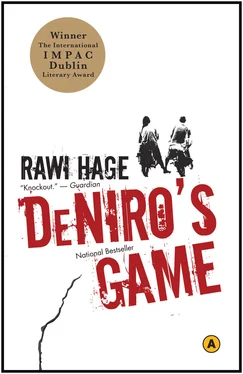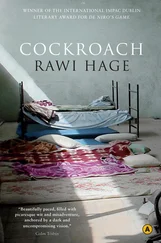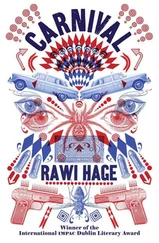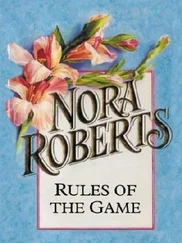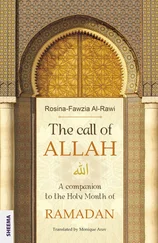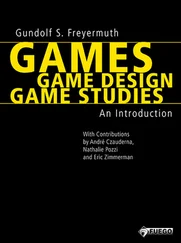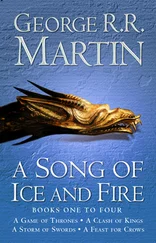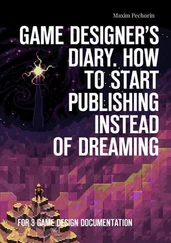I saw a BMW speeding up the hill. It was driven as if by a drunk, in zigzags, like a donkey climbing uphill.
I ran after the BMW, through the pine trees, through the moist hills, through the morning dew, pushing away the loose branches. I crossed the stone stairs and waited until the car stopped. A man opened the door and slowly stepped out of it. It was Rambo.
I walked toward him, and when he heard my steps he looked back and pulled out his gun in slow motion. I stopped. I saw his face, and my heart started to beat with sounds of death and drums. I felt as if I should walk all night again, and crush every mattress that would call me to sleep, and the sweat fell from my forehead and soaked my face in a bucket of cool liquid, and the morning breeze swept past me with jasmine scent. Rushing butterflies flapped their gigantic wings, raising the mountain’s fog from the valleys, and my eyelids fluttered. My hands stretched forward, both of my index fingers squeezed the trigger, and I shot at him. He smiled as I emptied my magazine, and the bullets flew and plunged into his cologne-scented flesh, his whisky’s final sighs, and his nails that gripped the door handle of his car. My gunshots rang through the deep valley with the sound of mourning bells, with the crack of hunters’ rifles in the morning sun. I shot him until he fell to the ground, and the thickening fog passed us by and carried his last breath.
I searched Rambo for his car keys and found them under his body. I touched his leather jacket, his white silk shirt, now turned brown with a mix of blood and red earth. His eyes watched me for the last time. I saw my image sinking down into his black pupils, and it frightened me.
I picked up the keys and drove his car down the slopes. Then I pulled over to the edge of the road, stepped out of the car, and vomited over the edge of a cliff. My head was pulled down to the earth, and I was on my knees.
THE SHIP WAS LEAVING that night. After I returned home, I packed a few of my clothes, picked up my passport and money, and went down the stairs for the last time. The neighbour women were splashing water up and down the marble. The water had come on that day, and there was water on the roofs and coming down the faucets, and the neighbour women had taken their buckets to the roof and carried them down full. Some looked at me, and some did not. I knew what was in their minds; I knew whose two hands and whose bucket were missing. I tiptoed over the little stream of water and soap. I rushed, and I didn’t say a word to the women. I did not greet, I did not thank, I did not scrub, I did not carry. I stepped over the water, seeking the seas.
I walked down the street. Nothing changes here, I thought. Those windows will last forever. Cars will multiply, park, and grow like plants, like colourful sidewalk trees. I did not look around me, I did not greet anyone or cry. I was just leaving.
A car passed by me, and then it stopped and came back. It was De Niro. He asked me to hop in.
I told him that I was fine, that I had to go to work.
I will drive you. We need to talk, he insisted. His eyes were red. He was either drunk or high, or maybe he couldn’t sleep from the noise of gunshots, the stomping drum of military boots.
When I asked him to leave me alone, he got out of the car, held me, and kissed my forehead. He told me, You are my brother. He walked me to the other side of the car, sat me in the passenger seat, then walked back to the driver’s side, touching the car on the way with one of his palms — a palm that had been laid on my neck, on my cheek, the same palm that had guided me to his car.
He drove fast. He did not stop, he did not brake. He looked at me, at times smiling, at times almost crying. He stayed silent until we passed Quarantina, and then he swung the car down to the highway that ended under the bridge, and he drove fast again, shifting gears and jerking the car. He slowed down, and we drove under the bridge, and he parked the car just behind its large concrete foundation. The sewer that carried our collective sins ran beside us.
We both remained silent, facing a large pile of sand and rocks and unfinished construction. George’s handgun lay beside us on the seat.
Then George started to laugh. He still could not look me in the eyes. He pulled out two cigarettes, lit them both, and handed me my share.
There was fresh blood on his military pants; a large black patch of it almost glowed.
He saw me looking at it. He reached for a bottle of whisky and drank some. When he offered it to me, I declined.
I killed today, he finally said.
I nodded without surprise.
I killed many. Many, he said as he played with his gun.
I nodded again and kept my silence for a moment longer. Then: I have to go, I said. I was no longer interested in hearing the sounds of the slaughterhouses, the rush of thick heels, the fireworks. I could only hear waves splashing over the bridge, bouncing on the car windshield, moving toward my feet.
George pulled out a tube, and using a little spoon that fished powder, he sniffed. He passed the back of his palm over his nose, then looked at the nose in the mirror. Turning, he smiled at me and said, Ten thousand. Ten thousand, maybe more, he mumbled. We must have killed ten thousand of them.
Who? I asked.
Children, women, we even shot the donkey, he said and laughed.
What happened, George? I asked, giving in.
He grabbed the gun and aimed it at the windshield, then looked at it and released a muffled laugh.
Talk, I said. If that is why you brought us here.
I will tell it all, he said. I will tell it all. . We attacked a Palestinian camp and killed by the hundreds, maybe thousands.
When?
These last few days.
How? Why? I asked.
We camped at the international airport in Lebanon. International, he repeated and laughed again. All week, after the assassination of Al-Rayess, we didn’t sleep. The men screamed for revenge. An Israeli liaison officer, Eitan, came by with Abou-Nahra. He said that there were still a few armed pockets in the Palestinian camps after the surrender. Abou-Nahra said, We have to purify the camps.
George laughed, and held the gun, and spun its barrel. De Niro’s a fucking good actor; you remember that scene in that movie, Bassam, when De Niro played his best friend? You are my best friend and my brother, you are.
He tried to hug me, but I pushed him away.
He continued. Fifteen hundred lions positioned at the airport we were. Nothing would stop us, nothing. We moved like thunder toward the Sabra and Shatilla refugee camps, along the wide road through Ouzai. We passed the Henri Chehab military compound, and another unit met us from the south army, men from the villages of Damour, Saadiyat, and Nameh. Those men never forgot their burned villages, those men were also lions. One of them, an older fellow, looked me in the eyes and said, We have been waiting a long time for this. So we killed! We killed! People were shot at random, entire families killed at dinner tables. Cadavers in their night-clothes, throats slit, axes used, hands separated from bodies, women cut in half. The Israelis surrounded the camps. And then an Israeli lieutenant named Roly, who was stationed near Bir Hassan, across from the stadium, sent a message to the camp committee to have all our men bring their weapons to the stadium. We told him that we do not take orders from him. We told him that orders came from Abou-Nahra, and that the high Israeli command knew about it. We moved farther in, and Israeli aircraft dropped eighty-one-millimetre illumination flares. The whole area was lit up; it was like being in a Hollywood movie. And I am De Niro in a movie, George said. Drink, he suddenly shouted at me. Drink!
I waved the bottle away from my face.
He drank, then spoke again. Everything was fluorescent white; you could see like it was daylight. The sky was glowing as if the Messiah himself had showed up. The units from the south were already inside. At the Akka hospital, some of our men followed the wounded to finish them off. When we arrived, we heard the scream of a woman. Three guys were raping a nurse on a doctor’s table. An Asian doctor had a photo of Arafat in his office; he started to speak in English to me. I said, Terrorist! You are a terrorist, and you have a terrorist photo on the wall. He spoke to me in English again. I beat him up with the handle of my gun.
Читать дальше
